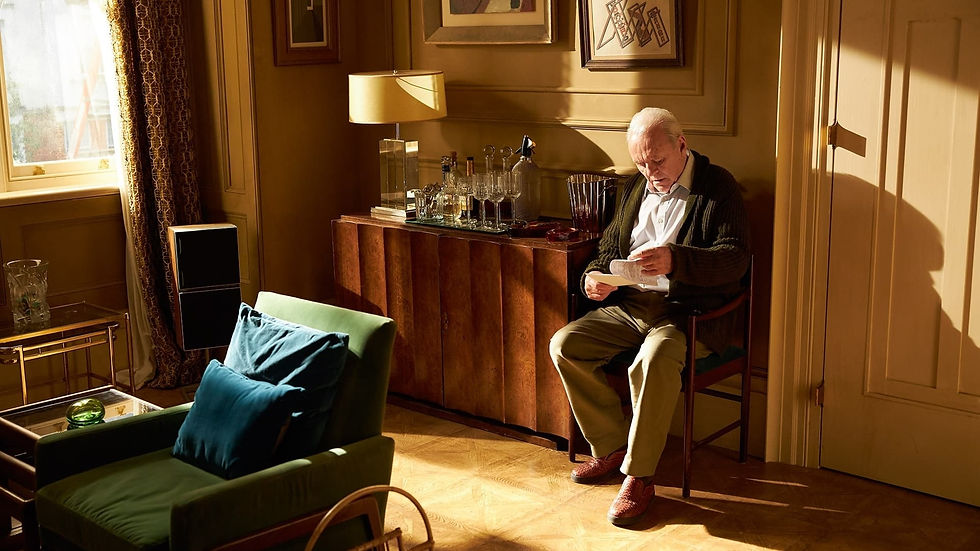The Father, The Daughter and The Flat; Looking Once Again To Space And The Fundamentals Of Film.
- Fiona Craughwell
- Apr 3, 2022
- 4 min read
What a surprise Fiona has found another film she can use in yet another rant about the importance of space in film and how ultimately, it is the foundation of cinema. This time we are looking at Florian Zeller’s highly praised The Father. For someone with minor directorial credits to their name, Zeller handles this film like a seasoned professional. This film also made Anthony Hopkins the oldest actor to win an Oscar in a competitive acting category, and once you have watched it, you can see why.
Yes, yes, I have spoken about space in film before and don’t worry, I will tag all of my relevant blog posts so you can enjoy them again. I will not go into the academic side of ‘space’ as I have gone into that at length previously, and boring you once seems like enough.
I have mentioned how the characters and, therefore, the viewer interact with the space in the film and how this gives insight into the character's inner psyche or how space can be used as a metaphor to say something about our broader society. The Father manages to do both.
As viewers, we can perceive a space in different ways, we can either move through the space with the protagonist, or we can associate with the camera and move through the space as it does, seeing what it allows us to see. Characters have a more intimate relationship with space; they see the spaces we can’t. So more often than not, we associate with the camera.

The Father is a simple story about a man struggling with ageing and the confusion he is experiencing, most like due to illness, perhaps dementia. The story is also about his daughter and her struggles to care for her Father during this challenging transition. We have seen dementia or illness associated with ageing in film before, but this is the first film I have seen where we not only see an interpretation, but we FEEL it. We can feel what it's like to move through a space that looks familiar and then only moments later be bewildered by it.
So how does it use space? Anthony, our main character, believes he is living alone in his flat as he has always done. However, slowly it becomes evident he is living in his daughter's flat with her. The film mainly takes place in his daughter's flat, but in this film, what a space starts is not necessarily how it will end up. One moment stands out in particular. Anthony is in his kitchen putting away his shopping and getting ready to make a cup of tea when he hears someone else entering what he believes to be his home. As soon as Anthony steps out of the kitchen, the house has changed, and so to his relationship with it.
The use of space is so subtle but incredibly effective and what makes it even more compelling is how Anthony responds to space. He knows something is not quite right, but he can’t pinpoint what exactly is wrong. His confusion matched our own. We are never entirely sure of where we are in the space, but neither is Anthony.

There is an extra element to The Father. This film uses space to express confusion and disorientation, but it also uses the character. It is a simple film with a simple story, and so there aren’t that many characters, but there are many actors. Characters merge, their faces change, as do their names and our main character, Anthony, become emotional and frustrated with the confusion. These characters also interact with the space. Often, this relationship to it seems peculiar to Anthony. To him, they don’t fit into the space. To him, he is the only one that belongs. The Father does not fill us in on every detail of the story because it doesn’t want us to. This film's goal is to disorientate us so we can emphasise our main character. The film creates gaps in the storyline and does not provide the tools to figure out what is happening.
This confusion is achieved through a simple story but with a complicated timeline. The film feels as though it is on a time loop. Scenes seem to repeat themselves, but the spaces or characters change. Unlike in most films, there is no final clarification on what the trues story is and what’s happening, and why should there be? We should feel as perplexed and indeed as upset as Anthony feels.

Of course, the masterful achievement of this film is not just down to a clever use of space, but without the stunning performances given by all involved, this film wouldn’t have been nearly as impactful or moving as it ended up being.
Because this film does not provide us with a conclusive storyline, people have been searching for meaning and answers but for me to try and figure out what happened is to miss the point entirely! After all, this film works so hard to replicate what it feels like, never fully knowing what’s happening around you, to be so close yet so far from your reality. Why would we want to ruin this wonderful creation by trying to work out what happened? The film finally moments all but tells us anyway, an older man who has lived a rich and full life is trying to cope with ageing and illness and isn’t that enough.






Comments